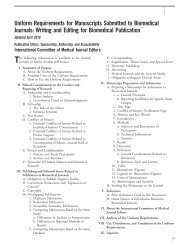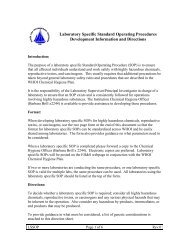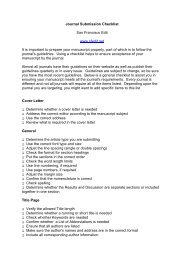Guidance for Preparing Standard Operating Procedures (SOPs)
Guidance for Preparing Standard Operating Procedures (SOPs)
Guidance for Preparing Standard Operating Procedures (SOPs)
You also want an ePaper? Increase the reach of your titles
YUMPU automatically turns print PDFs into web optimized ePapers that Google loves.
1. INTRODUCTION<br />
1.1 Overview<br />
GUIDANCE FOR PREPARING<br />
STANDARD OPERATING PROCEDURES<br />
A <strong>Standard</strong> <strong>Operating</strong> Procedure (SOP) is a set of written instructions that document a<br />
routine or repetitive activity followed by an organization. The development and use of <strong>SOPs</strong> are<br />
an integral part of a successful quality system as it provides individuals with the in<strong>for</strong>mation to<br />
per<strong>for</strong>m a job properly, and facilitates consistency in the quality and integrity of a product or endresult.<br />
<strong>SOPs</strong> describe both technical and administrative operational elements of an organization<br />
that would be managed under a work plan or a Quality Assurance (QA) Project Plan [EPA<br />
Requirements <strong>for</strong> QA Project Plans (QA/R-5) (EPA 2001a), or Chapter 5 of the EPA Quality<br />
Manual <strong>for</strong> Environmental Programs, EPA Manual 5360 A1] and under an organization’s Quality<br />
Management Plan [EPA Requirements <strong>for</strong> Quality Management Plans (QA/R-2) (EPA 2001b), or<br />
Chapter 3 of the EPA Quality Manual]. This document is designed to provide guidance in the<br />
preparation and use of an SOP within a quality system.<br />
1.2 Purpose<br />
<strong>SOPs</strong> detail the work processes that are to be conducted or followed within an<br />
organization. They document the way activities are to be per<strong>for</strong>med to facilitate consistent<br />
con<strong>for</strong>mance to technical and quality system requirements and to support data quality. <strong>SOPs</strong> are<br />
intended to be specific to the organization or facility whose activities are described and assist that<br />
organization to maintain their quality control and quality assurance processes and ensure<br />
compliance with governmental regulations.<br />
If not written correctly, <strong>SOPs</strong> are of limited value. In addition, the best written <strong>SOPs</strong> will<br />
fail if they are not followed. There<strong>for</strong>e, the use of <strong>SOPs</strong> needs to be reviewed and re-en<strong>for</strong>ced by<br />
management, preferably the direct supervisor. Current copies of the <strong>SOPs</strong> also need to be readily<br />
accessible <strong>for</strong> reference in the work areas of those individuals actually per<strong>for</strong>ming the activity,<br />
either in hard copy or electronic <strong>for</strong>mat, otherwise <strong>SOPs</strong> serve little purpose.<br />
1.3 Benefits<br />
The development and use of <strong>SOPs</strong> promotes quality through consistent implementation of a<br />
process or procedure within the organization, even if there are temporary or permanent personnel<br />
changes. <strong>SOPs</strong> can be used as a part of a personnel training program, since they should provide<br />
detailed work instructions. It minimizes opportunities <strong>for</strong> miscommunication. When historical<br />
data are being evaluated <strong>for</strong> current use, <strong>SOPs</strong> can also be valuable <strong>for</strong> reconstructing project<br />
activities when no other references are available. In addition, <strong>SOPs</strong> are frequently used as<br />
checklists by inspectors when auditing procedures. Ultimately, the benefits of a valid SOP are<br />
reduced work ef<strong>for</strong>t, along with improved data comparability, credibility, and legal defensibility.<br />
QA/G-6 1<br />
March 2001







